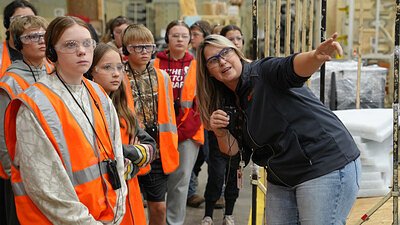
Future Forward: Ashley Furniture Invests in Skills, Reshoring, and the Next Generation of Manufacturers
As manufacturing faces a critical skills gap, Ashley Furniture is opening its doors to students, investing in domestic production, and pioneering a future where technology and craftsmanship converge.
Future Forward: Ashley Furniture Invests in Skills, Reshoring, and the Next Generation of Manufacturers
Arcadia, WI – In a sector grappling with a widening skills gap and supply chain disruptions, Ashley Furniture Industries is taking a proactive approach, not just to maintain its position as the world’s largest furniture manufacturer, but to actively shape the future of American manufacturing. Throughout October, the company opened the doors of its facilities across four states – North Carolina, Mississippi, Texas, and Wisconsin – to nearly 1,000 students as part of its annual Manufacturing Month tours.
Beyond a simple PR exercise, these tours represent a strategic investment in workforce development, a commitment to reshoring, and a vision for a manufacturing landscape where cutting-edge technology and skilled craftsmanship go hand in hand. The initiative aligns with a growing national need; recent reports indicate the US could face a shortage of 2.1 million manufacturing workers by 2030.
“It’s about more than just filling jobs,” explains a company representative. “It’s about inspiring the next generation to see manufacturing as a viable, rewarding, and innovative career path.”
Bridging the Skills Gap: A Hands-On Approach
The tours weren’t passive factory visits. Students from 15 schools were immersed in the modern manufacturing process, witnessing firsthand the integration of automation, robotics, and data analytics. The experience challenged preconceived notions about the industry, often portrayed as outdated and labor-intensive.
A teacher from a participating Wisconsin school noted, “All of our core classes, especially math and science, connect to what the students experienced. From analyzing numbers on the assembly line to robotic movement and foundational skills like teamwork, this was a valuable real-world experience.”
The impact extends beyond academic correlation. Experts say exposing students to real-world manufacturing environments is critical in attracting them to the sector. Many young people lack awareness of the advanced technologies and career opportunities available.
“There’s a perception problem,” explains an industry analyst. “Manufacturing isn’t just about repetitive tasks anymore. It’s about problem-solving, innovation, and working with cutting-edge technology. These tours help to shatter that outdated image.”
Reshoring and the Rise of Domestic Production
Ashley’s commitment to US-based manufacturing isn’t new, but it’s been amplified in recent years, driven by supply chain vulnerabilities exposed during the pandemic and a broader trend towards reshoring. The company has made significant investments in its domestic facilities, adopting advanced manufacturing technologies to improve efficiency and competitiveness.
“We’ve seen a significant increase in domestic manufacturing activity over the past few years,” says a state economic development official. “Companies are realizing the benefits of having greater control over their supply chains and reducing their reliance on overseas suppliers.”
While automation plays a key role in driving efficiency, it's not about replacing workers, but rather augmenting their skills and creating new opportunities. Ashley is actively investing in training programs to prepare its workforce for the jobs of the future.
“The skills required in manufacturing are evolving rapidly,” notes an industry expert. “Companies need to invest in training and upskilling their workforce to ensure they have the skills needed to operate and maintain these advanced technologies.”
A Vision for the Future of Manufacturing
Ashley’s Manufacturing Month initiative isn’t a standalone event, but rather a component of a broader strategy to build a sustainable and thriving manufacturing ecosystem. The company actively partners with local schools and community organizations to promote STEM education and career pathways.
“We believe that investing in the next generation of manufacturers is essential for our long-term success,” says a company representative. “We’re committed to providing students with the knowledge, skills, and opportunities they need to succeed in this dynamic and rewarding field.”
Experts say Ashley’s approach is a model for other manufacturers looking to address the skills gap and build a sustainable workforce. By opening its doors to students, investing in domestic production, and embracing innovation, Ashley is not only securing its own future but also contributing to the revitalization of American manufacturing.
One student who attended the tour remarked, “I never thought manufacturing could be so interesting. It’s not just about building things; it’s about solving problems and using technology to create something new. I’m definitely considering a career in this field now.”
As the manufacturing landscape continues to evolve, companies like Ashley Furniture are demonstrating that a commitment to innovation, workforce development, and domestic production is essential for success. The future of manufacturing isn’t just about building better products; it’s about building a better future for American workers and communities.
